Historical references:
- 1 January. Czechoslovakia ceases to exist when the Czech Republic and Slovakia become independent States.
- January. The Single European Market, envisaged since 1987, comes into being, signifying the free movement of goods, capital and workers, and the free establishment of businesses in Europe.
9 JANUARY - Bulgaria: Varna - International Language
Over one hundred citizens attend an assembly held by Bulgarian Radicals in the city on the Black Sea. After Michele Boselli, coordinator of activities in Bulgaria, delivered his report, the proceedings were mainly devoted to the theme of Esperanto as an international language, with speeches by Giorgio Pagano, Secretary of the Esperanto Radikala Asocio, and Kiril Popov, the President of the Bulgarian Esperantist Union.
27 JANUARY - Bosnia-Herzegovina: Sarajevo - Former Yugoslavia
RP Secretary Sergio Stanzani and RP President Emma Bonino go to the besieged capital, with a UN escort, while it is still being bombarded. They try and bring out Sarajevo Mayor Muhamed Kresvljakovic, so that he may embark on a political mission in Europe and open the proceedings of the upcoming Congress of the Radical Party of which he is a member. But the UN would not allow him to leave for security reasons.
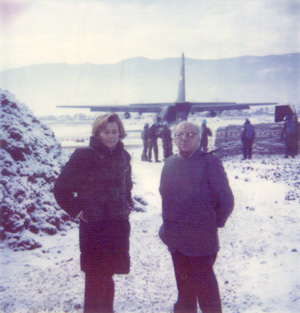
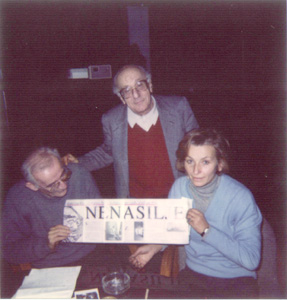
(didascalia: Left, Bonino and Stanzani at Sarajevo airport and, right, with the Mayor of Sarejevo.)
4/7 FEBRUARY - Italy: Rome XXXVI Congress of the Radical Party (2nd Session)
The Congress, which defines in six commissions the possible initiatives for the following months (on antiprohibitionism, abolition of the death penalty, the environment, linguistic democracy, federalism and nationality, transnational statute) sets a target of 30,000 members to be reached by the end of February as indispensable to the relaunch of the Party’s transnational initiatives.
While speaking at the Congress Macedonian Prime Minister Branko Crvenkovski stresses the importance of the role played by the RP to obtain international recognition for Macedonia.
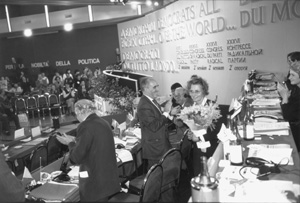
(didascalia: Branko Crvenkovski)
After an "extraordinary" membership campaign in Italy, featuring hundreds of personalities from the world of entertainment, culture and politics as testimonials and with extensive mass media coverage, 37,000 people join the RP - the highest membership ever - and contributions are made totalling over 13 billion Lire (7 million dollars).
Elected organs:
Secretary: Emma Bonino
Treasurer: Ottavio Lavaggi
17 FEBRUARY - UN: New York - Ad Hoc Tribunal
As a result of pressure exerted by the European Federalist Group and the Radical Party, the Italian Government presents at the United Nations a draft statute for the establishment of an international ad hoc tribunal charged with judging crimes committed in the Former Yugoslavia. France and Sweden present similar proposals.
Historical references:
- 22 February. United Nations. The Security Council approves Resolution 808 for the establishment of an international tribunal charged with judging war crimes committed in the Former Yugoslavia. The appointment of the judges and the financing of the court remain open questions.
27 FEBRUARY - Italy: Rome - Former Yugoslavia
After considerable pressure from the Radical Party, the Italian Government adopts an extraordinary measure and sends a jet fighter to Sarajevo. The Mayor is brought to Italy where he is received by the highest State authorities, starting with President Scalfaro and Pope John Paul II.
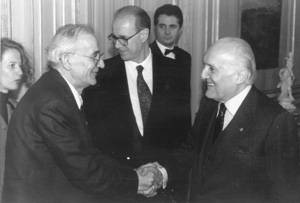
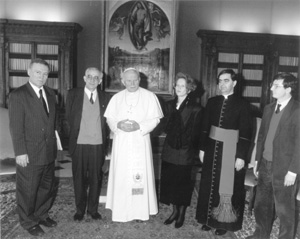
As a member of the RP, Mayor Muhamed Kresvijakovic also takes part in the membership campaign, appearing on television and at press conferences.
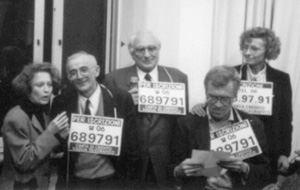
(didascalia: From left to right: Kresvljakovic, Pannella, Vigevano, Bonino, all wearing a sign round their necks with the RP telephone number)
23 MARCH - Belarus: Minsk - Death Penalty
A group of Radicals and activists from the League for Human Rights demonstrate for the abolition of the death penalty outside the Parliament, while the new criminal code is being discussed inside.
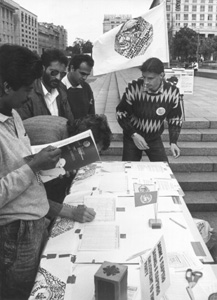
(didascalia: Collecting signatures against the death penalty)
27 MARCH - Ukraine: Kiev - Organizational Assembly
Meeting of Radical "points of reference" from 9 cities in the Ukraine and Moldavia. Participants discuss with RP Federal Council members Andrea Tamburi and Nikolaj Khramov, initiatives for parliamentary campaigns for the abolition of the death penalty world wide by 2000 and for the political integration of Ukraine into Europe. Fifty-one people join the Radical Party.
30 MARCH - Macedonia: Skopje - Democracy
Emma Bonino meets Macedonian Prime Minister Branko Crvenkovski and, later, Macedonian deputies who are members of the RP, to return Crvenkovski’s visit - the Premier attended the recent Radical Congress - and to study new initiatives for the recognition of the Republic.
2 APRIL - Belarus: Minsk - Assembly
Public assembly to launch the 1993 Radical Party membership campaign. Forty people attend, and debate the death penalty and antiprohibitionism on drugs. Andrea Tamburi and Kostantin Noskov, coordinator of activities in the capital, are among the speakers. Twelve citizens join the RP during the assembly, bringing the 1993 total up to forty-two.
The Minsk Radicals will have a small office in the central Square of the Conservertoire as their future premises.
2 APRIL - Italy: Rome - Justice
Press Conference held by the European Federalist Group to present the parliamentary initiative, promoted by Italy and at the international level, to free Lyndon H. LaRouche Jr., a seventy-year-old American economist and former Democratic presidential candidate, who has been in prison in Minnesota for 4 years after being framed by former U.S. President George Bush. Emma Bonino, of the European Federalist Group, Flaminio Piccoli, of the Christian Democrat Party, Helga Zepp LaRouche, President of the Schiller Institute and wife of the American dissident, and Sergio D’Elia take part in the press conference.
In recent weeks, a letter addressed to President Clinton, asking him to release and rehabilitate the U.S. politician, has been signed by over 300 parliamentarians throughout the world.
5 APRIL - Italy: Rome - International Court, Death Penalty
Radical Party press conference (held on the anniversary of the aggression launched against Sarajevo, which has been under siege for one year) in which, as well as the executive organs, Christian Democrat deputy Francesco D’Onofrio and economist Enrico Modigliani, take part, to launch the RP campaign for foreign membership, after the success of the Italian campaign that netted 37,000 members; and to explain the appeals asking that a permanent international criminal court be established and that the Government declare itself willing to host such a court (on 15 April the Italian Government would inform the UN that Italy was prepared to do just that); and for the right of each individual not to be killed following a legal sentence or judicial measure.
Historical references:
- 7 April. United Nations. The Security Council approves the admission of Macedonia to the UN, under the provisional name of F.Y.R.O.M. (Former Yugoslav Republic of Macedonia)
15 APRIL - Macedonia - Democracy
The Republic of Macedonia is officially recognized by Germany, Denmark, Belgium and, later, Italy. The Radical Party, committed to this objective for many months, pointed out that recognition was well overdue.
18 APRIL - Italy - Referendums, Antiprohibitionism
The referendums for a majority electoral system, the decriminalization of drugs, and the abolition of state funding for political parties, supported and promoted also by the Radical Party and CoRA, meet with tremendous success.
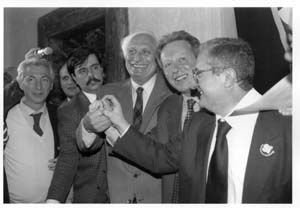
(didascalia) Marco Pannella, Mario Segni (DC- Christian Democrat Party) and Augusto Barbera (PCI - Italian Communist Party), the driving force behind the electoral referendum.
Historical references:
- April. Bosnia-Herzegovina. Bloody conflict between Croatians from Bosnia and Muslims, for the control of a number of areas in central Bosnia and of the city of Mostar.
24 APRIL - Croatia: Zagreb - Assembly
The assembly held by Radicals from Croatia, Slovenia and Bosnia-Herzegovina, attended by about 50 people, including RP Secretary Stanzani, General Councillors Dupuis, Ottoni, Marijana Stefanic, Zdravko Tomac and Vijekoslav Zugaj, unanimously approves a final document stating that:
"1. The TRS (Transnacionalna Radikina stranka) should enrol, before the end of 1993, 2,000 members, at least 30 of whom should be parliamentarians. This is the minimum number required to successfully launch Radical initiatives in this area;
2. An emergency Committee, chaired by Dr. Zdravko Tomac, should be set up to organize a membership campaign, in accordance with the final documents approved by the assembly.
Representatives from the most important Croatian and Bosnian parties, and from Slovenian organizations, made speeches; 35 new members joined the RP. The event was widely covered by the Croatian media.
24 APRIL - Italy: Rome - Death Penalty
MEP Adelaide Aglietta, Rapporteur for the European Parliament on the death penalty, the legislative situation and the objectives of the European abolitionist campaign, is one of the speakers at the inauguration of the Contact exhibition, featuring works by Emilio Leofreddi, Enrico Manera and Massimo Liberti, at the Arte Cortina gallery.
The exhibition also features a "life-size" electric chair in which Bernardo Bertolucci, Lindsay Kemp, Lina Wertmuller, Dario Argento and leading figures from the world of politics and culture, are photographed as testimonials. The show runs until 10 May.
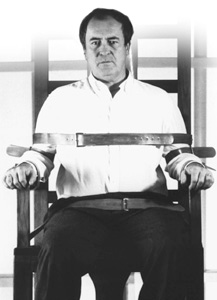
(didascalia: Film director Bernardo Bertolucci)
24 APRIL - Latvia: Riga - Assembly
The proceedings, in which about 40 people take part, including RP General Councillor Uldis Krastinsh and Supreme Soviet deputy and member of the Radical Party Eduard Aboltinish, are opened by Antonio Stango. At the end of the assembly 21 people join the Radical Party.
24 APRIL - Ukraine: Doneck - Assembly
The 50 participants include members of various parties, like Evgenija Ratnikova, President of Democratic Rukh, and Aleksandr Tsurkan, member of the Democratic Radical Party. RP General Councillors Tamburi and Khramov take the floor, and the Radical Party gains 16 new members.
30 APRIL - Lithuania: Vilnius - Radical Assembly
About 40 people attend, including deputies from the Sejm (Parliament) who are also members of the Radical Party: Linas Linkevicius - Vice-President of the Foreign Affairs Commission -, Neris Germanas and Jonas Pangonis.
Lithuanian television broadcasts a comprehensive reportage filmed at the assembly, while Antonio Stango of the RP Federal Council and Iokubas Minkevicius are interviewed by a several radio networks.
1 MAY - Ukraine: Leopoli - Assembly
Approximately 70 people attend the first public assembly held in the Ukraine, at the headquarters of the Society for the Defence of Monuments and Culture.
The meeting is opened by Mihail Batig, Ukraine MP and one of the first signatories of the appeal for the abolition of the death penalty in his country. Oleg Vedenskij, coordinator of the Amnesty International Leopoli group, elucidates on the campaign against the death penalty. The RP is represented by Tamburi, Khramov and Ivanov. Seventeen more people join the Radical Party.
4 MAY - Italy: Rome - International Language
The Minister for Education establishes a Commission for the teaching of languages in elementary schools and of the International Language in other grades, in response to the request from the parliamentary intergroup "For a Federalist Language and the Reform of Linguistic Policy", promoted by the RP. The Commission has been given the task of developing a programme to raise awareness, and provide training and refresher courses for teachers.
13/15 MAY - Romania: Bucharest - Meetings, Assembly
A Radical delegation led by Secretary Stanzani and Olivier Dupuis, accompanied by Romanian deputies Erno Borbel and Vasile Diacon, holds several meetings with the leaderships of the most important parties and with Oliviu Gherman, President of the Senate and of the majority party, the FDSN (Democratic Front of National Salvation).
During the second general assembly held at the Hotel Turist by Romanian Radicals, the campaign for the establishment of an International Criminal Court (ICC) was presented, for which Romanian parliamentarians are already collecting signatures. The project of constructing a Balkan rail link, which would connect Albania to Moldavia, and the proposal for the establishment of a High Authority of the Danube that would concern itself with economic and ecological problems concerning the river basin, was also discussed.
The meeting was reported extensively in the national press, although one or two scandalmongering articles described the Radical Party as the party of Italian porno-star "Cicciolina". (ANR5624)
18/21 MAY - UN: New York - International Court
Emma Bonino, RP Secretary and Secretary of the Presidency of the Italian Chamber of Deputies, meets with UN Secretary-General Boutros Boutros Ghali, the President of the UN General Assembly Stoyan Ganeev, and numerous other officials, in New York. The subjects dealt with during the various talks were the permanent International Criminal Court, the Ad Hoc Tribunal for crimes committed in the Former Yugoslavia, the reform of the United Nations, the management of water resources and, more specifically, the protection of the Danube, the Balkan rail link, and the campaign for the abolition of the death penalty worldwide by 2000.
The Transnational Radical Party announces that it will continue to exert pressure to finalize the procedures according to which the Tribunal will operate and to set a specific date for its establishment, adding that a campaign was already underway for the collection of signatures that will be delivered to the UN Secretary-General.
Secretary-General Ghali informs the RP that he is sending a personal message to the upcoming assembly of Bulgarian parliamentarians who are members of the RP in Sofia, via one of his representatives who will attend.
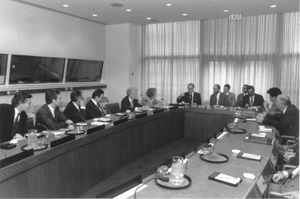
(didascalia: New York: Emma Bonino at the UN)
20/21 MAY - Estonia: Tallin - Radical Assembly
More than one hundred people take part in the Assembly of Radical members and sympathizers from Estonia, Latvia and Lithuania, held at the "Sakala" Congress Centre. Many parliamentarians and personalities, including Mindaugas Stakvicevicius, President of the Lithuanian parliamentary Commission for Human and Civil Rights and Ethnic Problems, take the floor during the proceedings, which are opened by Secretary Sergio Stanzani. General Councillor Lorenzo Strik-Lievers delivers the closing speech, and 49 new members join the Radical Party.
As well as raising the issue of ethnic minorities and citizens’ rights (which would be dealt with more fully during the conference held the following day), the debate focussed on the need to gather reliable information on environmental hazards and, more particularly, on the condition of the Baltic Sea and the presence of nuclear plants and waste; and to coordinate Radicals in the Baltic States with the Scandinavian branches of Amnesty International, to render the campaign for the abolition of the death penalty more effective in those areas.
The international conference on "The Baltic States: Governmentalism, Individual Rights and Citizenship in relation to International Conventions" held at the Congress Centre the next day, was introduced by Antonio Stango. (ANR5650)
19 MAY - Hungary: Budapest - Membership
At the end of a long meeting at the RP’s Budapest headquarters, attended by members of the General Council, Lajos Balla and Olivier Dupuis, and the President of the Social-Democratic League of Voivodina, Nenad Canak, Secretary Vladimir Kranjcevic and Councillor Gion Stevan, the leadership of the League joined the Radical Party. The Social-Democratic League of Voivodina, a democratic opposition party, has about 10,000 members in this province whose autonomy has been taken away by Belgrade.
19/23 MAY - Italy: Rome - Human Rights, Cuba
At the Radical Party headquarters in Via di Torre Argentina 76, the exhibition "Prigioni e zattere" (Prisoners and Rafts) and a meeting with Bertrand Rosenthal, author of Fin de siècle à La Havane, is organized by the Italian Committee for Human Rights in Cuba. The exhibition had previously been on show in a private art gallery, but was forced to close because of excessive violence perpetrated by a group of saboteurs.
20 MAY - Croatia: Zagreb - Media, Ad Hoc Tribunal
The first of a series of weekly conferences, chaired by Croatian deputy and President of the Radical organization in the Former Yugoslavia Zdravko Tomac, is held at the Radical office in Zagreb. The conferences would continue for over a month, and enjoy regular coverage from state television, which devoted a few minutes each week to the initiative.
For the benefit of the many journalists present, Dr. Tomac dwelt at length on the international initiative for the effective establishment of the Tribunal for war crimes, pointing out that numerous deputies had signed the relative motion proposed by the RP, and expressing the hope that the 60 signatures necessary for its presentation would be obtained.
To date 1,300 Croatian citizens have signed the petition for the Tribunal, and signatures are still being collected at the Radical stand in the Square of Flowers in Zagreb.
27 MAY - EP: Strasbourg, International Court
On the initiative of Adelaide Aglietta, Marco Taradash and Virginio Bettini, all of whom are MEPs belonging to the Radical Party, the European Parliament approves a resolution addressed to the upcoming UN World Conference on Human Rights in Vienna, asking that all States that still apply the death penalty be obliged to impose a moratorium on executions, with a view to the elimination of capital punishment from all legislation.
In the resolution the EP also asked for the establishment of "a permanent international criminal court or an international court of human rights, to prevent people who violate human rights from going unpunished.
29 MAY - Moldavia: Chisinau - Assembly
A meeting is held at the Centre of Republican Culture by parliamentarians belonging to the RP, Nikolaj Khramov and Vladimir Ivanov, on the abolition of the death penalty from Moldavia’s new draft Constitution, and the five political prisoners (including RP member Ilie Ilascu) who are being tried in Tiraspol on charges of conducting activities against the self-proclaimed and unrecognized "Republic of Transistria". Nineteen people join the RP during the assembly. RP members would later send a petition to the Tiraspol authorities asking that the prisoners be returned to the courts of the Republic of Moldavia.
2 JUNE - Moldavia: Chisinau - Meetings, Assembly
Moldavian President Mircea Snegur receives RP General Councillors Andrea Tamburi, Nikolaj Khramov and Vladimir Ivanov, who present their Radical initiative in favour of the elimination of the death penalty from the new draft Constitution.
President Snegur congratulates them on the fact that many leading politicians and deputies in Moldavia belong to the RP, and asks the RP leadership to use its influence and international standing to exert pressure for the so-called "Ilascu group", accused of activities against the state and presently on trial in Tiraspol, capital of the self-proclaimed "Republic of Transistria, to be returned to Moldavia to stand trial.
The news is reported by the news agency Moldova Press, the Mesager newscast, and leading Moldavian newspapers.
The same day 36 Moldavian deputies take part in a preparatory meeting prior to the assembly of parliamentarians belonging to the RP in Sofia, and sign an appeal against the death penalty in the Republic. Thirty deputies join the RP.
11 June - UN: Vienna - Death Penalty
A large Radical delegation attends the UN World Conference on Human Rights in Vienna, and meets with Ibrahim Fall, Secretary-General of the Conference, to have the issue of the abolition of the death penalty put on the agenda. After assuring the delegation he would do his utmost to achieve this, Fall received from the Radicals two petitions for the establishment of the International Court and for the abolition of the death penalty, which to date have been signed by 50,000 people, including hundreds of parliamentarians.
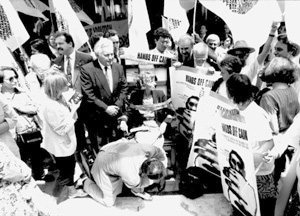
(didascalia: Vienna, Austria. UN headquarters. Emma Bonino in the electric chair during a demonstration)
RP holds a silent demonstration at the opening of the UN Conference on Human Rights, to protest against the exclusion of the Dalai Lama, on China’s insistence, who had asked if he could speak at the conference and tell the world about the Tibetan tragedy.
Historical references:
- 16 June: Geneva. Peace Conference: Serbia and Croatia agree to the Owen-Stoltenberg Plan envisaging the division of Bosnia-Herzegovina into three parts on an ethnic basis. Bosnian President Izetbegovic is against the plan and the Muslims re-launch their offensive in the next few months.
24 JUNE - EP: Strasbourg - Tibet
On the initiative of Aglietta and Bettini, Green MEPs and members of the RP, the European Parliament approves a resolution condemning the arrest of a number of political dissidents in Tibet, and the UN’s refusal to allow the Dalai Lama to participate in the World Conference on Human Rights in Vienna.
15/19 July - Bulgaria: Sofia - Assembly of Parliamentarians, RP General Council
The first Assembly of parliamentarians belonging to the Radical Party, from all over the world, is held to coincide with the RP General Council meeting.
The Radical Party has almost 5,000 foreign members from 60 different countries. They include: 17 members of government; 19 MEPs; 531 members of national parliaments; 35 members of unrecognized State Assemblies; exponents of over 80 national parties. The Party also has 38,000 Italian members. In her report, Secretary Emma Bonino stresses that this remarkable achievement was the result of a mobilization campaign without precedent and the continual attention of the media, and proposes to the Party a series of projects and related initiatives concerning: the United Nations, the Former Yugoslavia, the Environment, Drugs, AIDS, and an International Language.
Motion approved in Sofia by the General Council
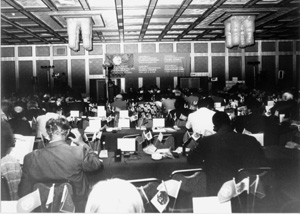
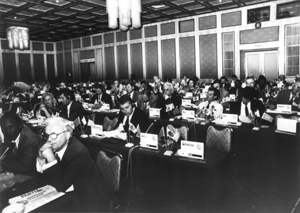
(17-18 July 1993)
2 AUGUST - Argentina: Buenos Aires - Antiprohibitionism
At the Congress on Laws Governing the War on Drugs and Crime, the Latin American Parliament discusses the possibility of legalization. Emma Bonino, invited to participate by the Vice-President Eduardo Varela Cid, Argentinian deputy, member of the Organizing Committee of the Congress and member of the RP, explains why antiprohibitionism makes sense and outlines possible initiatives.
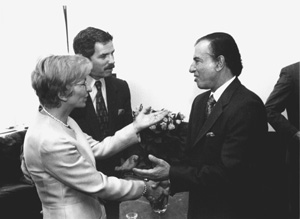
(didascalia: Emma Bonino with Carlos Menem)
15 AUGUST - Italy: Rome - Death Penalty, Ad Hoc Tribunal for the Former Yugoslavia
The RP sets up its traditional August Bank Holiday stand at the Trevi Fountain, where Secretary Emma Bonino and 40 activists collect signatures on appeals for the institution of the Ad-Hoc Tribunal for the Former Yugoslavia and for clemency to be granted to Gary Graham, condemned to die in Texas.
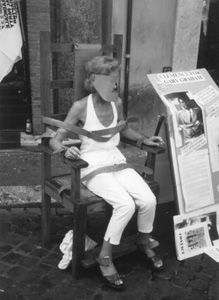
(didascalia: Emma Bonino strapped in the electric chair during a demonstration)
9 SEPTEMBER - Italy: Rome - Ad Hoc Tribunal for the Former Yugoslavia
A written appeal asking that the Ad-Hoc Tribunal to judge war crimes in the Former Yugoslavia be made operative is addressed to the United Nations, and the collection of signatures begins...
Appeal for the Tribunal and first signatories
15 SEPTEMBER - Italy: Rome - Ad Hoc Tribunal for the Former Yugoslavia
Emma Bonino writes to UN Secretary-General Boutros Boutros Ghali to arrange a meeting for the consignment of the signatures on the appeal for the Ad-Hoc Tribunal for the Former Yugoslavia. To date, 650 parliamentarians from many European and non-European countries, 14 Nobel Prize-winners and over 500 personalities from the world of art, culture and politics are among the thousands who have signed the appeal.
19 SEPTEMBER - Europe: Various Capitals - Ad Hoc Tribunal
Radical Party activists in Barcelona, Brussels, Budapest, Kiev, Lisbon, Moscow, Prague and Zagreb, set up tables to collect signatures on the appeal asking that the Ad-Hoc Tribunal for the Former Yugoslavia become operative immediately.
21/25 SEPTEMBER - Albania / Montenegro - Meetings
Massimo Lensi, Secretary of the General Council, and Sandro Ottoni, member of the Radical Party Secretariat, go to Albania and Montenegro to attend a series of meetings with parliamentarians in Tirana, and leaders of the Montenegrin Liberal Party in Cetinje. They take the floor at the Congress of the Liberal Party, presenting initiatives elaborated according to the guidelines laid down in the motion approved in Sofia by the General Council.
During the last round of talks, the Montenegrin Liberals shed light on the difficult situation in which the country finds itself because of the embargo, which "mainly favours the cause of Slobodan Milosevic, by strengthening Serbian Unitarianism and the desire to persecute". President Slavko Perovic also speaks about the harassment of the opposition, which is deprived of economic and informative instruments, persecuted in the work place, and violently attacked during its peaceful demonstrations.
26 SEPTEMBER - Italy: Assisi - Antimilitarism, Human Rights
"The Radical Party will be there to demonstrate its unswerving commitment to the establishment, within the sphere of the UN, of the International Tribunal against crimes perpetrated in the Former Yugoslavia. This extremely important action, which we are resolutely urging the United Nations to undertake, could be the first step towards establishing an International Criminal Court to judge crimes against humanity". With these words Emma Bonino confirms that the Radical Party would take part in the traditional pacifist march from Perugia to Assisi.
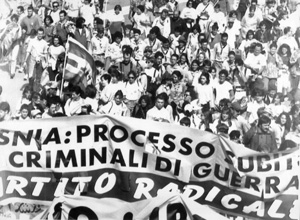
(didascalia: the RP’s banner)
26 SEPTEMBER - Moldavia - Death Penalty
On the eve of the discussion of the new draft Constitution, several Moldavian parliamentarians (including various members of the Transnational Radical Party), sign an appeal, addressed to the Parliament, asking that the death penalty be excluded from the new Constitution.
29 SEPTEMBER - Bosnia-Herzegovina: Sarajevo - Ad Hoc Tribunal for the Former Yugoslavia
In a Sarajevo under siege, whose only link with the rest of the world is a sporadic UN airlift, Radical exponent Sandro Ottoni meet with the authorities of the city and the Parliament to present the international appeal for the establishment of the Ad-Hoc Tribunal for the Former Yugoslavia.
As he signs the appeal the Mayor of Sarejevo, Muhamed Kresevljakovic, who is also a member of the RP, declares: "The International Tribunal should be established because many, many crimes have been committed in this war and the perpetrators must be punished. It is in the interest not only of Bosnia-Herzegovina but also the rest of the world".
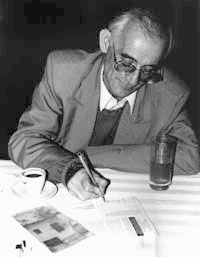
(didascalia: Sarajevo, Bosnia. Muhamed Kresevljakovic, Mayor of Sarajevo and member of the RP, signs the appeal for the Ad-Hoc Tribunal for the Former Yugoslavia.)
30 SEPTEMBER - Italy: Rome - Ad Hoc Tribunal for the Former Yugoslavia
Italian President Oscar Luigi Scalfaro receives a delegation of signatories of the appeal for the immediate establishment of the Ad-Hoc Tribunal for the Former Yugoslavia. The President is "utterly convinced" of the validity of the campaign underway for the Tribunal.
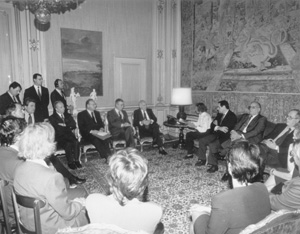
(didascalia: Quirinal Palace, Rome President Scalfaro with Emma Bonino and other signatories)
24 OCTOBER - France: Strasbourg - Environment, Balkan Rail Link
An amendment drawn up by Gianfranco Dell’Alba, Secretary of the Assembly of Parliamentarians, and Olivier Dupuis, President of the RP General Council, and presented by Virginio Bettini, Green MEP and member of the RP, is approved by the European Parliament and subsequently included in the Amaral Report.
The Report, which concerns the transport network within the European Community, also anticipates links with non-European countries. The Radical amendment proposes, as well as the scheduled "Koper-Ljubljana-Maribor-Budapest-Bucharest-Soha-(Saloniki)" link, a "Brindisi-Durazzo-Tirana-Skopje-Sofia-Bucharest-Iasi-Chisinau" connection.
During the previous months, the initiative for the creation of a Balkan link (a rail link in the Radical proposal) resulted in over 500 parliamentarians from Moldavia, Romania, Bulgaria, Macedonia, Kosovo, Albania and Turkey signing an appeal addressed to the European Community.
25 OCTOBER - Italy: Rome - Media, "1994"
The first issue of 1994 - The Radical Newspaper is published. Some of the biggest names in Italian advertising create "shocking" messages and images for the newspaper, which launches the 1994 Radical Party membership campaign.
At a press conference photographer Oliviero Toscani and creative geniuses like Gavino Sanna, Emanuele Pirella and Maurizio D’Adda, Staino and Bucchi, present "their" newspaper to Emma Bonino.
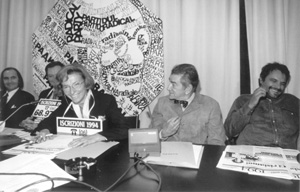
(didascalia: From left to right: Gavino Sanna, Ottavio Lavaggi (RP Treasurer), Emma Bonino, Bruno Zevi (architect and President of the RP), Oliviero Toscani)
In the space of one month, 16 issues of this newspaper are sent to almost 40,000 Italian members of the Radical Party.
25 OCTOBER - U.S.: New York - Media, The New York Times
"Transnational Law and Nonviolence are the most Effective and Radical Ways to Build a Better World" is the headline of a full-page ad run by the Radical Party in The New York Times, the day before an RP delegation was to meet with the UN Secretary-General.
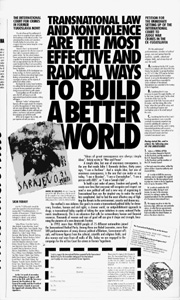
Over 700 Americans sent messages to the Radical Party, either by letter or via the Internet.
26 OCTOBER - Croatia: Zagreb - International Court
President of the Croatian Parliament Stipe Mesic and Foreign Minister Mate Granic, meet separately with an RP delegation (Zdravko Tomac, Sandro Ottoni and a number of Croatian parliamentarians) and sign the appeal for the establishment of the International Tribunal.
30 OCTOBER - U.S.: New York - United Nations
In New York, Emma Bonino meets with UN Vice Secretary-General Gillian Martin Sorensen, coordinator of the preparations for the celebration of the 50th Anniversary of the UN in 1995.
1 NOVEMBER - UN: New York - Ad Hoc Tribunal
A delegation led by Emma Bonino meets with UN Secretary-General Boutros Boutros Ghali and presents him with the 25,000 signatures collected throughout the world on appeals asking for the effective institution of the Ad-Hoc Tribunal for the Former Yugoslavia.
After announcing that the International Tribunal would in fact be installed in The Hague on 17 November, Boutros Ghali made it quite clear that "without the support of parliamentary groups, personalities from the world of culture and NGOs, the initiative could very well have failed".
The delegation is composed of: Hans Janitschek, former Secretary of the Socialist International, Kemal Kurspahic, editor of Oslobodjenje, Mona Makram Ebeid, Vice-President of Parliamentarians for Global Action, Vincent McGee, former President of Amnesty International in the U.S., Walter McLean, Canadian deputy, Izet Muhamedagic, Bosnian deputy, Arieh Neier, President of the Open Society Fund Inc., Yuri Orlov, President of the Helsinki Federation for Human Rights, Slavko Perovic, President of the Liberal Alliance of Montenegro, Zdravko Tomac, Croatian deputy.
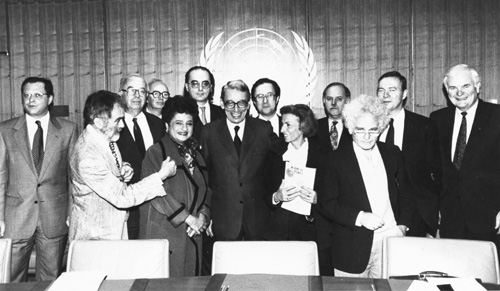
2 NOVEMBER - U.S.: New York - Media
The San Francisco Chronicle runs a front-page story on the visit of the Radical Party delegation to the UN and the RP’s telecoms initiatives.
4 NOVEMBER - France: Paris - International Language
Demonstration organized by the Radical Party outside the UNESCO General Conference for the approval of a convention that would adopt Esperanto for international communications. During the proceedings, and for the first time, a country, Italy, presents at UNESCO a resolution asking that the organization make a real commitment on its two previous resolutions favouring the use of Esperanto.
The Director-General of UNESCO, Mayor, personally commits himself to this resolution, which could perfectly well be incorporated in the UNESCO "Linguapax" programme, meaning that the organization would supply 50% of the financing.
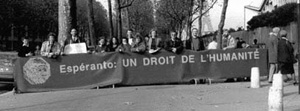
5 NOVEMBER - Croatia: Zagreb, Split - AIDS, Antiprohibitionism
Meetings on the subject of AIDS and antiprohibitionism are held in Zagreb and Split, by Emilio Vesce, Regional Councillor of the Veneto and Radical exponent.
7 NOVEMBER - Italy: Rome - AIDS, Antiprohibitionism
The Coordinamento Radicale Antiproibizionista launches its Italian campaign for the legalization of soft drugs. A popular bill for the legalization of soft drugs and a new AIDS policy is opened for signature.
9 NOVEMBER - Albania: Tirana - Ad Hoc Tribunal for the Former Yugoslavia
A delegation from the RP, composed of Massimo Lensi and other Radical exponents, meets with the President of the Albanian Parliament Pjeter Arbnori, who signs the appeal for the International Tribunal to judge war crimes in the Former Yugoslavia.
16 NOVEMBER - Various capitals and cities - Ad Hoc Tribunal
The day before the inauguration of the Ad-Hoc Tribunal for the Former Yugoslavia, press conferences are held in 14 cities (Ankara, Bucharest, Budapest, Kiev, London, Madrid, Moscow, Oviedo, Ouagadougou, Rome, Strasbourg, Subotica, Tirana, Zagreb) to urge the resolution of the problems of the financing and functioning of the Tribunal. They are chaired by signatories and proponents of the appeals. The Italian Foreign and Justice Ministers take part in the Rome press conference, along with Marco Pannella and Ottavio Lavaggi.
Historical references:
- 17 November. Holland. First hearing of the International Tribunal for war crimes in the Former Yugoslavia takes place in The Hague.
17 NOVEMBER - U.S.: Baltimore - Antiprohibitionism
Emma Bonino participates in the "Transcontinental Conference on the Harm Reduction Policy", organized by the Drug Policy Foundation and the European Cities on Drug Policy. She proposes denouncing the juridical and institutional instruments that determine the prohibitionist choice: the Vienna Convention on drugs of 1961 (amended in 1972), the 1971 Convention on Psychotropic Substances, and the 1998 Convention on the Commerce of Drugs.
17/20 NOVEMBER - U.S.: Washington - AIDS, Antiprohibitionism
Marino Busdachin, member of the Radical Party Secretariat, and Filippo di Robilant, special assistant to the Secretariat, take part in the "Seventh International Conference on Drug Policy Reform" organized by the Drug Policy Foundation. Useful contacts are made with leading American experts specializing in the prevention of AIDS with regard to drug addiction.
Historical references:
- 19 November. Bosnia-Herzegovina. The Mostar Bridge, a monument symbolizing coexistence and the centuries-old history of the Balkans, is blown up by Croatian artillery.
19 NOVEMBER - U.S.: Washington - AIDS
After presenting the Radical Party project for an institutional campaign, Filippo di Robilant meets Kristine Gebbie, recently appointed as National Aids Policy Coordinator by President Clinton. Further meetings are held with a number of American foundations, including AMFAR (American Foundation for Aids Research).
23 NOVEMBER - Italy: Rome - United Nations
The Defence Commission of the Italian Chamber of Deputies approves an agenda (first signatory Roberto Cicciomessere, deputy and member of the RP) asking that UN peace-keeping operations be financed by the Defence Budget. The Commission for Foreign Affairs of the Italian Chamber of Deputies approves an agenda (first signatory Emma Bonino) asking that the compulsory contributions to the United Nations be paid regularly, and on time.
2 DECEMBER - EP: Brussels: Belgium - International Language, ERA
Antonio La Pergola, President of the Commission for Culture, Youth, Education and Media of the European Parliament, distributes to the parliamentary members of the Commission a study on the International Language carried out by the ERA (Esperanto Radikala Asocio).
7/11 DECEMBER - Brussels: Belgium - Death Penalty, Hands off Cain Congress
"Hands off Cain", the international campaign for the abolition of the death penalty by 2000, holds its first world congress in which parliamentarians, jurists and leaders of human rights’ organizations, from 40 countries, take part.
Objectives of the Motion - Honorary Presidency
12/17 DECEMBER - MOROCCO: Marrakech - AIDS
The Radical Party is represented by Filippo Di Robilant at the Eighth World Conference on AIDS. An important contact is established with the Harvard School of Public Health, in the person of Daniel Tarantola, one of the most respected experts in the struggle against AIDS.
15 DECEMBER - Russia: Moscow - Death Penalty
Press conference for the Founding Congress of "Hands off Cain" in Russia. Participants include: Mamuka Tsagareli, Vice-President of the RP General Council, Igor Bezrukov, lawyer and official of the Presidency of the Russian Federation, Kostantin Kedrov, leader writer for Isvestia; Andrea Tamburi, member of the Radical Party Secretariat; Nikolaj Khramov, member of the RP General Council.
17 DECEMBER - Italy: Rome - United Nations
Emma Bonino takes part in the seminar "New UN Strategies for Peace", organized by the Società Italiana per l’Organizzazione Internazionale, the Istituto Affari Internazionali and the Peace Watch Committee.
"The General Council of the Radical Party, assembled in Sofia on 17 and 18 July 1993,
expresses its gratitude for the message sent by UN Secretary-General Boutros Boutros Ghali, which it intends to take up, especially where the Secretary-General emphasizes that "the peace imperative must above all engrave itself in the consciousness of the individual; the development imperative is now held to be one of the rights of man; democracy is the new imperative that we are imposing on ourselves".
The General Council also recognizes the "Declaration" approved by the UN Security Council at its meeting of Heads of Government and of State on 31 January 1992, and likewise the Declaration of Rio de Janeiro and "Agenda 21" for the environment and sustainable development, and their warning that the serious threats to peace and security are no longer simply military ones, but derive mainly from the instability that arises daily in the humanitarian and ecological fields.
Nevertheless, the General Council feels obliged to point out that the instruments do not yet exist to ensure the application of these policies and principles on a day-to-day basis. There is still a lack, at the required transnational and supranational level, of positive, codified law recognized by countries and by individuals, and also of structures and instruments to ensure that it is respected, to prevent it from being violated, to impose the necessary sanctions. The most important institutional body to whom these tasks are entrusted, i.e., the United Nations system, beginning with the Security Council, lacks the means and resources - and also the full democratic legitimacy - to carry out this task, and is unable to make its authority felt on a broad scale, creating frustration and a lack of confidence among peoples.
There is hardly a place in the world that does not suffer from attacks on peace and security. In the territories of the Former Soviet Union the borders of the new States are continually contested: from Nagorno-Karabach to Moldavia human rights are crushed, and even legacies of an illustrious history and culture are senselessly destroyed. The dangerous splits in the Former Yugoslavia, which could seriously affect the European equilibrium, are reason for great concern. In these countries it is necessary to block and suppress the actions of war carried out by the Yugoslav Federation (Serbia-Montenegro) with the intent of extending its territory through ethnic cleansing and genocide, but also to put an end to the oppression and violence that are perpetrated in many areas to eradicate cultural, ethnic and territorial identities. In Somalia, for example, it is necessary to swiftly disarm the opposing factions and to establish the conditions for a democratic state, as requested by the majority of the peoples in question.
Unfortunately, in both the former Yugoslavia and Somalia, the United Nations is not in a position to carry out its mandate or to perform the role that the conscience and hopes of the men and women of this world demand of it.
In order for the message of the UN Secretary-General, the declarations of the Security Council, "Agenda 21" and all other documents regarding policy to become political objectives to pursue and achieve, it is necessary to mount initiatives designed to involve and mobilize individuals and peoples. This can only be achieved by a political force that operates resolutely, unfalteringly, at the transnational level. Our commitment to develop this force has become far more conscious and determined in the last few days, as a result of the debate held by the General Council of the Transnational Radical Party whose statutory organs have been entrusted with realizing the project. Aware of the difficulties involved and limited resources available, the General Council believes that the following objectives would be given widespread and powerful support, also at the popular level, and permit powerful initiatives and nonviolent Gandhian political struggles to be undertaken:
1) to ensure the respect of engagements and deadlines concerning the institution, with procedures and structures established by the United Nations, of the International Tribunal for crimes committed in the Former Yugoslavia, particularly those related to the ethnic cleansing and genocide still being perpetrated;
2) to take effective action at various levels, above all parliamentary, to ensure that the recognition of the Federal Republic of Yugoslavia (Serbia-Montenegro) - as in the case of the other Former Yugoslav Republics - is conditioned by the application or renewal of constitutional and legislative guarantees of the rights of the individuals and the peoples who have been oppressed in Bosnia and seriously threatened in Kosovo and in Voivodina;
3) to take all possible steps to ensure that, within the sphere of the campaign for the abolition of the death penalty by 2000, the right not to be killed by law is affirmed by irrevocable international law (jus cogens) - also via UN Resolutions - in the near future;
4) to coordinate and strengthen forces and initiatives aimed at obtaining the denouncement or modification of the International Conventions that bind States to a prohibitionist policy on drugs, also by constituting in the various Parliaments intergroups or antiprohibitionist groups for the reform of the policy on drugs at the national and regional level, along the following lines:
a) a new policy to stop the "more police, more drug-trafficking" spiral that characterizes the fight against crime,;
b) a policy of harm reduction, as applied in the experiments carried out by the cities that signed the Frankfurt Resolution;
c) promotion of initiatives undertaken by the Lega Internazionale Antiproibizionista (International Antiprohibitionist League), federated with the Radical Party;
5) to make every effort, in the parliaments and within international organizations, to encourage the spread and progressive adoption - also formal - of the International Language as a concrete instrument for guaranteeing the right to language; the tutelage of the linguistic-cultural planetary ecosystem; democratic cultural integration in Europe and the world; the development of a common international identity, as well as a national identity, in keeping with the single human family concept.
The innovative policies sanctioned - by the UN - in the Declaration of Rio, "Agenda 21" and other policy documents, despite their inadequacies, demand radical changes in national and international environmental policies and insist on "sustainable development" in the industrialized world and in the poorer areas; in short, the question of the environment has finally left behind regional perspectives and become an essential element in the global system of security, development and democracy which is the principal challenge of our times. However, in this sphere, as in others, the policy declarations have not been backed up by definite objectives, funding, instruments or commitments. Above all, what is lacking is a juridical system suited to the scale of the problems. Therefore, also in this field the Party’s engagement must take the form of initiatives with precise deadlines, undertaken in the parliaments where members of the Radical Party are present. The Secretary and the Treasurer of the Party will make the necessary operational choices concerning top-priority objectives, starting in Central and Eastern Europe: the creation of a Pan-European Great Rivers and Waterways Community; the right to information; the urgent closing down of particularly dangerous nuclear power stations; and the development of efficient energy.
Until now, individual rights have been entrusted to weak, fragmented, uncoordinated Institutions and initiatives. Therefore, the General Council entrusts the Statutory organs and RP members, above all parliamentarians, with the task of creating the right conditions for the development of initiatives and the strengthening of national and supranational institutions, to defend human rights, including the right to an ethnic, cultural, linguistic and religious identity: only the creation of a system like the one specified in the European Convention on Human Rights of Strasbourg can fully legitimize the right of the individual to belong to an ethnic minority. In the same way, the struggle against the spread of AIDS must be strengthened worldwide, particularly in Africa.
On the basis of the budget and the report
The General Council notes that, unless costs are drastically reduced by the creation of self-financing offices in the various countries, the Party will find itself in the same financial difficulties that recently jeopardized the existence of the Party and which, in any case, constitute the major obstacle that must be overcome if the Radical political project is to succeed.
The CG therefore authorizes the Statutory Organs to undertake the initiatives necessary to solve the problem.
The General Council, having taken note of the commitment assumed by the Assembly of parliamentarians belonging to the Radical Party, will follow up the suggestions made by the Treasurer concerning the publication of a parliamentary newsletter and the relative service structures to be set up in the various parliaments.
Lastly, the General Council issues a mandate to the Executive Organs to verify the feasibility of a project and research structure to support the activities of the Party, as proposed by the Treasurer".
Elected organs:
President of the General Council: Olivier Dupuis
Appeal for the Tribunal for war crimes committed in the Former Yugoslavia to become operational
"We the undersigned, parliamentarians, members of elected bodies, men and women of academic, scientific, cultural and religious circles, and citizens of the world:
A. Considering that the UN Security Council, under the Seventh Chapter of the Charter and on the basis of the Secretary-General's report, has decided with Resolution 827 of 25 May 1993 to establish an International Tribunal for the purpose of judging and punishing the people responsible for the serious violations of international humanitarian law committed in the territory of the Former Yugoslavia;
B. Considering that it is necessary to respect the urgent need, stressed by the Security Council itself, to effectively establish the Tribunal, to appoint the chief judge and judges, and to install them in office at The Hague, the seat of the Tribunal, and subsequently to open inquiries and hearings connected to the actual judging of the crimes;
C. Considering that the swift commencement of the activity of the ad-hoc Tribunal is an extremely important step towards the affirmation of the supremacy of human rights, the law, and the institutionalization of an international jurisdiction aimed at creating a permanent court equipped to judge and punish the people responsible for international crimes;
We make a solemn appeal
To the President and the members of the General Assembly
To the President and the members of the Security Council
To the Secretary-General of the United Nations
1. That each strive, within their respective spheres of competence and responsibility:
- to meet the conditions and technical requirements necessary for the International Tribunal for the Former Yugoslavia to start operating by December 1993 at the latest;
- to see that the UN General Assembly takes the required decisions, at its next session, to set in motion the procedures for the establishment of a Permanent International Criminal Court;
2. We engage ourselves, within our respective spheres, to bring pressure to bear upon our governments to take the necessary action, both internally and within the United Nations, to achieve the above objectives".
Signatories of the appeal include:
Nobel laureates:
Sidney Altman, Oscar Luis Arias Sanchez, Julius Axelrod, Joseph Brodsky, Stanley Cohen, Herbert Hauptman, Jean-Marie Lehn, Vassily Leontiev, Rita Levi Montalcini, Mairead Corrigan Maguire, Naguib Mahfouz, Cweslaw Milosz, Franco Modigliani, Neville Mott, George Palade, Linus Pauling, Adolfo Perez Esquivel, John Charles Polanyi, Ilya Prigogine, Hamilton Smith, George Wald, Maurice Wilkins.
Personalities:
Irina Alberti Ilovskaya, Francisco Arrabal, John Ashberry, Vladimir Bukovsky, Furio Colombo, Diego Cordovez, Lord Ralf Dahrendorf, Adem Demaqui, Lord Desai, Jiri Dienstbier, Umberto Eco, Lawrence Ferlinghetti, Arne Fjortoft, Carlos Franqui, Vittorio Gassman, Allen Ginsberg, Peter Goldmark, Gisele Halimi, Marek Halter, Dieter Heinrich, Eugene Ionesco, Alejandro Iodorowsky, Ismail Kadaré, Lindsay Kemp, Enes Kisevic, Leszek Kolakowski, Bernard Kouchner, William Kunstler, Kemal Kurspahic, Henri Laborit, Brice Lalonde, Bernard Laponche, Pedrag Matvejevic, Vincent McGee, Marie Claude Mendes-France. Percy S. Mistry, Domenico Modugno, Olivier Mongin, Indro Montanelli, Trevor Mostyn, Peter Michael Muller, Arieh Neier, Yuri Orlov, Idrissa Ouedraogo, Sergio Pininfarina, Leonid Pliusch, Pedro Ramirez, Ibrahim Rugova, Prince Sadruddin Aga Khan, Fernando Savater, Arthur Schlesinger, George Soros, Giorgio Strehler, Vo Van Ai, Mario Vargas Llosa, Manuel Vazquez Montalban, Cesar Verduga, Gore Vidal, Wim Wenders, Simon Wiesenthal, Maurice Williams, Antonino Zichichi.
11 December 1993 - FIRST WORLD CONGRESS
For the International Campaign "HANDS OFF CAIN"
Objectives:
"...
1. To affirm, through foreign policy and within the sphere of all the international organizations - above all the United Nations -, and above all through a moratorium on executions, the principle of the State’s being unable to dispose of the life of any one who is condemned by a court, even for the most serious crime;
2. To support the project for the establishment of a permanent International Criminal Court that categorically excludes the death penalty;
3. To set in motion international contentious procedure against State parties that apply the death penalty in violation of the limits set down in Art. 6 of the International Covenant on Civil and Political Rights;
4. To systematically raise objections to the reservations made by States that upon ratification of the International Covenant on Civil and Political Rights refuse to agree to any of the limitations imposed therein on the death penalty..".
An Honorary Presidency is elected, composed of:
Adelaide Aglietta, Co-President of the Green Group at the EP; Giandonato Caggiano, Director of the Società Italiana per L'Organizzazione Internazionale and lecturer in International Law; Liliana Cavani, film director; Adem Demaqui, Chairman of the Human Rights Committe in Kosovo and winner of the Sacharov Peace Prize; François Fejto, writer: Alélé Habidou, deputy from Niger; Yokuba Minkievicius, Lithuanian philosopher; Marco Pannella, Italian deputy, MEP and President of the Radical Party; Antonio Maria Pereira, Chairman of the Foreign Affairs Committee of the Portuguese Parliament, and Zvodimir Separovic, former Croatian Foreign Minister and jurist.
Members of the Board: Gaqo Apostoli (Albania), deputy; Igor Bezrukov (Russia), jurist; Aberto Castiel (Brazil) philosopher; Paolo Cesari (Italy), journalist; Ashanti Chimurenga, Amnesty International coordinator for the campaign to abolish the death penalty in the U.S.; Markisan Chuchuc (Ukraine), deputy; Sergio D'Elia (Italy), HOC coordinator ; Mariateresa Di Lascia (Italy) HOC coordinator; Olivier Dupuis (Belgium); Peter Hodgkinson (U.K.), lecturer at the University of Westminster; Samir Labidi (Tunisia) jurist; Lisa Lagorza-Maza (Philippines), President of the "Gabriella" organization; Petru Munteanu (Moldavia), deputy; Ibrahim N'doure (Mali), deputy; Cyril Pillay (South Africa), deputy; Anatolij Pristavkin (Russia), Chairman of the Presidential Committee for Clemency; Olivia Ratti (Italy) HOC coordinator; Cesare Salvi (Italy), deputy; William Schabas (Canada), lecturer in International Law; Emilio Vesce (Italy), regional councillor of the Veneto.